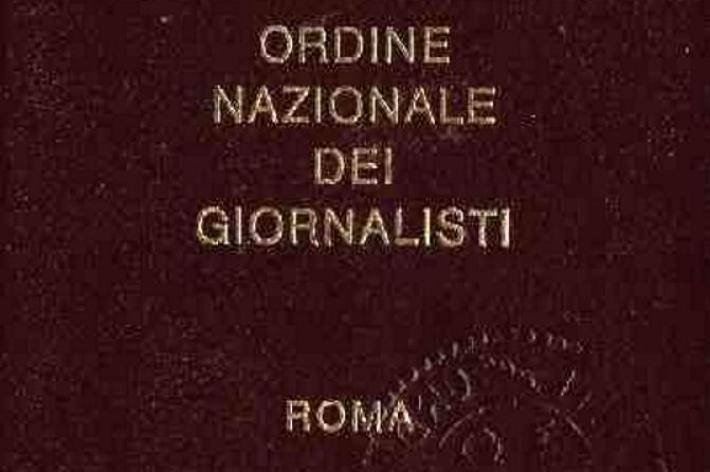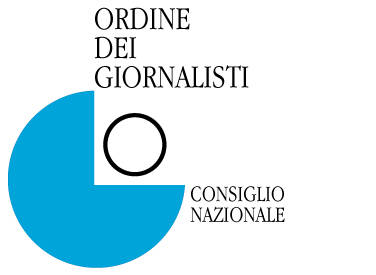"Italian Journalists—Burn Your Draft Card!" Do-It-Yourself Liberalization
We all carry around our bundle of contradictions. Let’s see: I consider myself a tolerant person, certainly not a racist. But when my bike was stolen from in front of our building, my suspicions immediately fell on the large and constantly morphing Rom (Gypsy) family living in the run-down house next to the abandoned railroad tracks out back.
None of us is perfectly coherent and consistent. And most of us find a way to go along in life as if our hypocrisies weighed almost nothing. We succeed in keeping them tucked away, offstage in the wings, out of sight. But the professional journalists of Italy have a huge monkey – a chimpanzee, a gorilla – perched on their back that, no matter how hard they try, they cannot pretend is not there. It’s called the ODG – l’Ordine dei Giornalisti. .
It’s a Fascist organization in origin. Its current leaders and apologists will tell you that it’s no longer so. They acknowledge that it was born as Il Duce’s brainchild in 1928, but argue that it was transformed by the 1963 law that created its modern-day incarnation. Really, though, it remains the same monkey. Maybe he’s wearing a different hat or vest, but the nature of the beast continues to be the egregiously anti-democratic one it had when it sprang from the mind of that Machiavellian chest-puffer of the jutted jaw. Mussolini, having been a successful propagandist himself, knew a great deal about how much power could be derived from organically linking the interests of the press establishment and those of the state.
I’m American. An Ohio-born, New Jersey-raised citizen of the USA. And I was a professional journalist – reporter, correspondent and editor – for nearly 30 years before moving from Miami to Le Marche in 2006 with my lovely Marchigiana wife and our four dual-national sons. The idea was that we wanted our kids, who were by then thoroughly American, to have the chance to become likewise thoroughly European: to go to school for a few or several years in Italy and thus broaden their cultural and intellectual horizons. Five years down the road, that project is working out quite well.
But this morning we were listening to Radio 3's Pagina like we do every day, and the conductor was lamenting, in a reasonable and professorial way, the damage done to Italian society by its entrenched corporations – the exclusive and protectionist associations of pharmacists, taxi drivers, real estate agents or whatever – all the hundreds of large and small interest groups and lobbies that make this nation so un-modern and less free as it tries to drag itself into the 21st century. And I said out loud, to the radio, “Yeah, and what about you? And your corporation?”
Because the ODG is especially noxious among all the different sorts of legalized mafias in Italy. (Let’s not shrink from the term. If the shoe fits, wear it, as they say.) It is particularly odious because it flies in the face of the concept of freedom of expression – of speech and of the press – that should be the ideal held most dear by all the women and men who have dedicated themselves to keeping their fellow citizens well informed, in the knowledge that democracy cannot function if those citizens don’t know what is going on. That is why the American Founding Fathers, those brilliant and radical iconoclasts named Jefferson and Franklin and Madison, put in the very first Amendment to the Constitution the explicit declaration that “Congress shall make no law abridging the freedom of speech, or of the press.”
Any law that determines that only certain people, ones who have obtained the State’s stamp of approval, can exercise the profession of journalism is, of course, an abridgment of freedom of the press. In America, people from all sorts of academic formations and all walks of life work as journalists. They make their way up or are left by the wayside in the establishment or the anti-establishment press, not by way of membership in an exclusive club but on merit, according to their talents and abilities and insight as judged by their editors. These men and women, tested and tempered by years on the job, come to embody the discernment and knowledge that accrue with the passage of time, as happens in all professions.
“Obligatory membership in a journalists’ guild is immoral, because it tends to limit what does not have and should not have limits, namely the free expression of thought,” said renowned Italian publisher Giulio Einaudi in 1945.
Indeed, no other modern liberal industrialized democracy has an Ordine dei Giornalisti similar to the Italian institution. Countries that have such obligatory, officially sanctioned guilds are generally either authoritarian or totalitarian.
It’s clear, though, that journalists of all political stripes work and report and publish in Italy. There is no ideological litmus test applied by l’Ordine, as would be the case with such organizations in Cuba or Kazakhstan. Even so, Italy is the only Western European nation judged only “partly free” in the much-cited World Press Freedom Index issued annually by the Washington-based NGO Freedom House. And the mere existence of The Order is considered one of the mitigating elements.
Gunter Grass and Joseph Ratzinger can (or could) avail themselves of the excuse that they were obliged, while still callow youths, to join Fascist organizations. Professional journalists in Italy today might be inclined to protest that, because of the obligatory nature of the ODG law, they have no choice. But it would be a rather pitiful spectacle, watching them try to take cover behind that fig leaf.
Its inherent limitation of freedom of expression is the ODG’s ugliest aspect. The fact that in Italy there exists in the Penal Code the crime of practicing journalism without a license, or that the Ordine can and does at times perform the function of censor (the thing most hated by any good journalist anywhere) are among the sort of uniquely Italian absurdities that would be amusing if they weren’t true. That tessera-carrying journalists, members of the club, get discounts on mortgages, airfares, train tickets and even movie tickets and parking fees makes the existence of such an organization cynical at best and shameful at worst.
The faithful practice of journalism is a noble profession, an essential component of a democratic society, of a way of life that makes our individual lives so much freer and more exciting and enjoyable than the lives of our forbears who lived under despots and kings, or the lives of those unlucky souls who today abide under tyrants. Those who practice it are fortunate and privileged, but it’s a privilege on a higher plane than a cheap flight to Paris or a subsidized week in Rimini.
The nature of their vocation compels journalists to observe a particularly demanding ethical code. In this crucial, transformational moment of modern Italian history, each and every member of the ODG has the rare and sublime opportunity to take a simple straightforward step toward creation of a freer and more democratic society. A sort of Do-It-Yourself liberalization. What could be more attractive than that?
This is my suggestion, which takes the form of a challenge: Burn your draft card
Encourage each other to do so. Make a show of it. Like hundreds of young American men did in the late 1960s and early 1970s after receiving word from Washington that they had been conscripted into the army to be sent to the other side of the world to kill Vietnamese. “I refuse to be a part of this mess,” they declared as they set a match to the document, often in scenes of public theater while cheered on by supporters.
And they, by their action, were facing jail or exile. Not just the disappearance of an unjustifiable entitlement.





































i-Italy
Facebook
Google+
This work may not be reproduced, in whole or in part, without prior written permission.
Questo lavoro non può essere riprodotto, in tutto o in parte, senza permesso scritto.